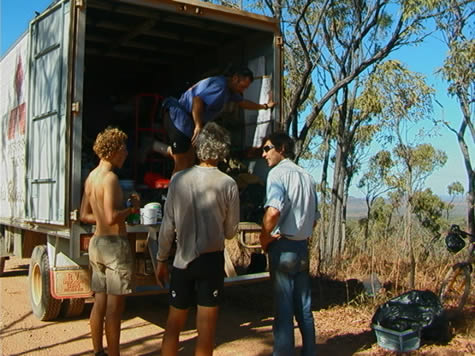When I first started planning this leg of the expedition I had it in my head to rollerblade to Darwin on the sealed roads. This idea was quickly revised on a trip I did to Townsville last October for a speaking gig: the road had no shoulder and would pose a serious risk to a cyclist let along anyone on a pair of skates.
So then I got to thinking about cycling. But having spent so much time and effort pedaling across the Pacific Ocean to Australia it seemed a bit tame to just jump on a push-bike and crank a relatively easy 2600 kms to Darwin. Plus I wouldn’t get to see much of the country confined to a sealed road. So I started planning an off-road route, taking in as many interested parts of the country en route (within reason) and hopefully getting to see the interior of Australia in as pure a form as I could. But in order to do this, with the distances between water stops being so enormous (not to mention the mention the food we’d need to carry with us), it became abundantly clear early on that an off-road route would only be possible with a support vehicle.

Now you may well ask, “Isn’t using a support vehicle powered by diesel (a fossil fuel) cheating for an expedition that is trying to circle the world using only human power”. And in a way you’d be right. But I had to make a judgment call. Would I bike to Darwin on a boring old sealed road, pulling all my food and water in a BOB trailer, but not see much of the country other than fuel stations and mile after mile of tarred bitumen? Or would I compromise by bringing a vehicle along and thereby seeing the real Australia, and being able to share it with classrooms around the world thanks to the satellite uplink equipment we’d be able to take with us (the way you are able to read this update for example)?
It’s a judgment call we all have to make on a daily basis in our individual lives, no matter who we are and where we live in the world: what and how much do we consume and do we really need to consume it in the first place? Living in a sustainable world doesn’t mean you never use a motorcar or use any other fossil fueled machine. But it does mean becoming aware of why you’re using what you’re using and what the minimum is you can get away with actually needing. It’ all about becoming more accountable to the world and future generations, sensitive to the effects of one’s actions both locally and globally. It’s about becoming aware of our own Ecological Footprint.
Suggested learning activities: write a short passage about how you get to school each day (i.e. by car, train, walking, riding a bike). Now imagine taking a different method of getting to school than you are used to and list the following:
- how different you think the experience would be for you.
- how differently you think this alternative method of travel would impact the environment and/or people, either locally and/or globally? List whether these impacts would be positive or negative, listing your reasons.
jason